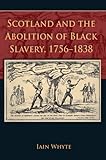Scotland and the Abolition of Black Slavery, 1756-1838 / Iain Whyte.
Material type: TextPublisher: Edinburgh : Edinburgh University Press, [2022]Copyright date: ©2006Description: 1 online resource (256 p.)Content type:
TextPublisher: Edinburgh : Edinburgh University Press, [2022]Copyright date: ©2006Description: 1 online resource (256 p.)Content type: - 9780748624324
- 9780748626991
- Antislavery movements -- History -- 18th century -- Scotland
- Antislavery movements -- History -- 19th century -- Scotland
- Antislavery movements -- Scotland -- History -- 18th century
- Antislavery movements -- Scotland -- History -- 19th century
- Public opinion -- History -- 18th century -- Scotland
- Public opinion -- History -- 19th century -- Scotland
- Public opinion -- Scotland -- History -- 18th century
- Public opinion -- Scotland -- History -- 19th century
- Slavery and the church -- History -- 18th century -- Scotland
- Slavery and the church -- History -- 19th century -- Scotland
- Slavery and the church -- Scotland -- History -- 18th century
- Slavery and the church -- Scotland -- History -- 19th century
- Slavery -- Public opinion -- History -- 18th century -- Scotland
- Slavery -- Public opinion -- History -- 19th century -- Scotland -- Scotland -- Schottland
- Slavery -- Scotland -- Public opinion -- History -- 18th century
- Slavery -- Scotland -- Public opinion -- History -- 19th century
- Scottish Studies
- HISTORY / Europe / Great Britain / General
- 326.80941109033 22
- HT1163 .W49 2006eb
- online - DeGruyter
- Issued also in print.
| Item type | Current library | Call number | URL | Status | Notes | Barcode | |
|---|---|---|---|---|---|---|---|
 eBook
eBook
|
Biblioteca "Angelicum" Pont. Univ. S.Tommaso d'Aquino Nuvola online | online - DeGruyter (Browse shelf(Opens below)) | Online access | Not for loan (Accesso limitato) | Accesso per gli utenti autorizzati / Access for authorized users | (dgr)9780748626991 |
Frontmatter -- CONTENTS -- Acknowledgements -- List of Abbreviations -- List of Figures -- Foreword by Archbishop -- Introduction -- 1. Black Slaves in Scotland and Baptism -- 2. The Lords and the Profits - West Indian Commerce and the Scottish Enlightenment -- 3. Pulpits, Presbyteries and Petitions on the Trade -- 4. London Scots in the Movement for Abolition -- 5. Unfinished Business in Europe and Scots Countervoices on Emancipation -- 6. Coming Out of Sin - the Road from Mitigation to the Call for Immediate Abolition -- 7. Evangelism in Jamaica, Theology in Scotland, but Freedom Deferred -- 8. Eyes on the Prize - Focus, Faith and Fervour -- Bibliography -- Index
restricted access online access with authorization star
http://purl.org/coar/access_right/c_16ec
GBS_insertPreviewButtonPopup('ISBN:9780748624331);Although much has been written about Scottish involvement in slavery, the contribution of Scots to the abolition of black slavery has not yet been sufficiently recognised. This book starts with a Virginian slave seeking his freedom in Scotland in 1756 and ends with the abolition of the apprenticeship scheme in the West Indian colonies in 1838. Contemporary documents and periodicals reveal a groundswell of revulsion to what was described as "the horrible traffik in humans". Petitions to Parliament came from remote islands in Shetland as well as from large public meetings in cities. In a land steeped in religion, ministers and church leaders took the lead in giving theological support to the cause of abolition. The contributions of five London Scots who were pivotal to the campaign throughout Britain are set against opposition to abolition from many Scots with commercial interests in the slave trade and the sugar plantations.Missionaries and miners, trades guilds and lawyers all played their parts in challenging slavery. Many of their struggles and frustrations are detailed for the first time in an assessment of the unique contribution made by Scotland and the Scots to the destruction of an institution whose effects are still with us today."
Issued also in print.
Mode of access: Internet via World Wide Web.
In English.
Description based on online resource; title from PDF title page (publisher's Web site, viewed 02. Mrz 2022)


